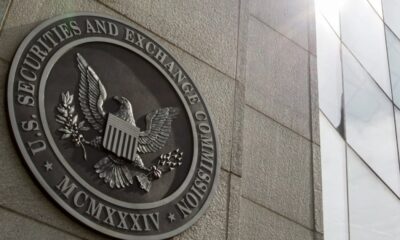Science
Texas Lawsuit Targets Wall Street Firms Over Anti-Coal Allegations

A lawsuit filed by Texas Attorney General Ken Paxton and ten other Republican attorneys general alleges that major Wall Street firms are operating as an “investment cartel” to suppress coal production while increasing their profits. The suit, which targets three of the largest asset managers—BlackRock, Vanguard, and State Street—claims these firms are manipulating the energy market, contributing to higher costs for American consumers.
The legal action comes in the wake of a broader campaign initiated by Republican lawmakers against environmental, social, and governance (ESG) initiatives. Since 2022, various state officials have warned banks and investment firms about potential antitrust violations related to their participation in climate-focused alliances. According to Denise Hearn, a senior fellow at the Columbia Center on Sustainable Investment, this ongoing scrutiny has created significant uncertainty across the financial ecosystem.
In a critical development, a US District Court judge in Tyler, Texas, recently declined to dismiss the lawsuit against the asset managers, allowing the case to proceed to trial. However, the judge did dismiss three of the twenty-one counts presented. BlackRock stated that the case lacks factual support and expressed confidence in its ability to defend against the claims. Vanguard committed to a vigorous defense, while State Street described the lawsuit as “baseless and without merit.” The Texas Attorney General’s Office did not respond to requests for comment.
The lawsuit’s core argument revolves around the assertion that the asset managers have collaborated to limit coal output, thereby enhancing their own profitability. The firms allegedly joined voluntary initiatives, such as the Net Zero Asset Managers Initiative and Climate Action 100+, with the aim to address climate concerns. These alliances, which they have since exited, reportedly influenced coal producers to reduce output and provide more climate-related disclosures.
Hearn raised a provocative question regarding the implications of the lawsuit: “If the coal companies were all colluding together to restrict output, then shouldn’t they also be violating antitrust?” The attorneys general are contending that the asset managers’ collective influence led to reduced coal production.
Passive investing through index funds is a focal point in this case. These funds aim to mirror market returns by holding shares in various companies. The outcome of this lawsuit could reshape the landscape of passive investment in the United States, depending on whether the plaintiffs or defendants prevail.
The lawsuit is drawing considerable attention not just from climate advocacy groups but also from the financial sector. If BlackRock, Vanguard, and State Street successfully defend their practices, it may mitigate pressure on other financial entities involved in similar climate initiatives.
Conversely, if the lawsuit succeeds, it could fundamentally alter the operational dynamics of financial institutions in relation to climate commitments. Hearn noted that this case could result in a significant shift in how passive investing is conducted.
The implications are far-reaching. The editorial board of The Wall Street Journal criticized the lawsuit as “misconceived” and described its arguments as “strained” and “bizarre.” The case challenges existing collaborative efforts among financial players to engage in climate action and introduces new claims surrounding “common ownership,” where a shareholder holds stakes in competing companies.
Research conducted by economists at Harvard Business School has indicated a lack of evidence supporting claims of antitrust violations in climate alliances. The study examined 11 major climate initiatives and 424 financial institutions over ten years, concluding that firms involved in such alliances were more likely to adopt emission reduction targets and engage in sustainable business practices.
As the global landscape shifts towards greater climate accountability, with at least 35 countries mandating climate-related disclosures, the United States faces a contrasting political environment. For instance, California plans to require large businesses to report their direct and indirect emissions starting next year.
Rothstein from Ceres emphasized the importance of accurate data for making informed investment decisions, stating, “Throughout the world, there’s greater recognition and, to be honest, less debate about the importance of climate information.” Ceres is a founding member of Climate Action 100+, which now includes over 600 investor members globally.
The contrasting political climates in the US and other major economies create a challenging environment for companies striving for sustainability. Tufano pointed out that many firms are currently faced with “greenhushing,” where they retreat from climate commitments due to political pressures, despite the persistent influence of market demands.
As the lawsuit unfolds, its outcomes could significantly influence the relationship between financial practices and climate objectives, redefining the future of both industries.
-

 Politics4 weeks ago
Politics4 weeks agoSecwepemc First Nation Seeks Aboriginal Title Over Kamloops Area
-

 World5 months ago
World5 months agoScientists Unearth Ancient Antarctic Ice to Unlock Climate Secrets
-

 Entertainment5 months ago
Entertainment5 months agoTrump and McCormick to Announce $70 Billion Energy Investments
-

 Science5 months ago
Science5 months agoFour Astronauts Return to Earth After International Space Station Mission
-

 Lifestyle5 months ago
Lifestyle5 months agoTransLink Launches Food Truck Program to Boost Revenue in Vancouver
-

 Technology3 months ago
Technology3 months agoApple Notes Enhances Functionality with Markdown Support in macOS 26
-

 Lifestyle3 months ago
Lifestyle3 months agoManitoba’s Burger Champion Shines Again Amid Dining Innovations
-

 Top Stories2 months ago
Top Stories2 months agoUrgent Update: Fatal Crash on Highway 99 Claims Life of Pitt Meadows Man
-

 Politics4 months ago
Politics4 months agoUkrainian Tennis Star Elina Svitolina Faces Death Threats Online
-

 Sports5 months ago
Sports5 months agoSearch Underway for Missing Hunter Amid Hokkaido Bear Emergency
-

 Politics5 months ago
Politics5 months agoCarney Engages First Nations Leaders at Development Law Summit
-

 Technology5 months ago
Technology5 months agoFrosthaven Launches Early Access on July 31, 2025



















